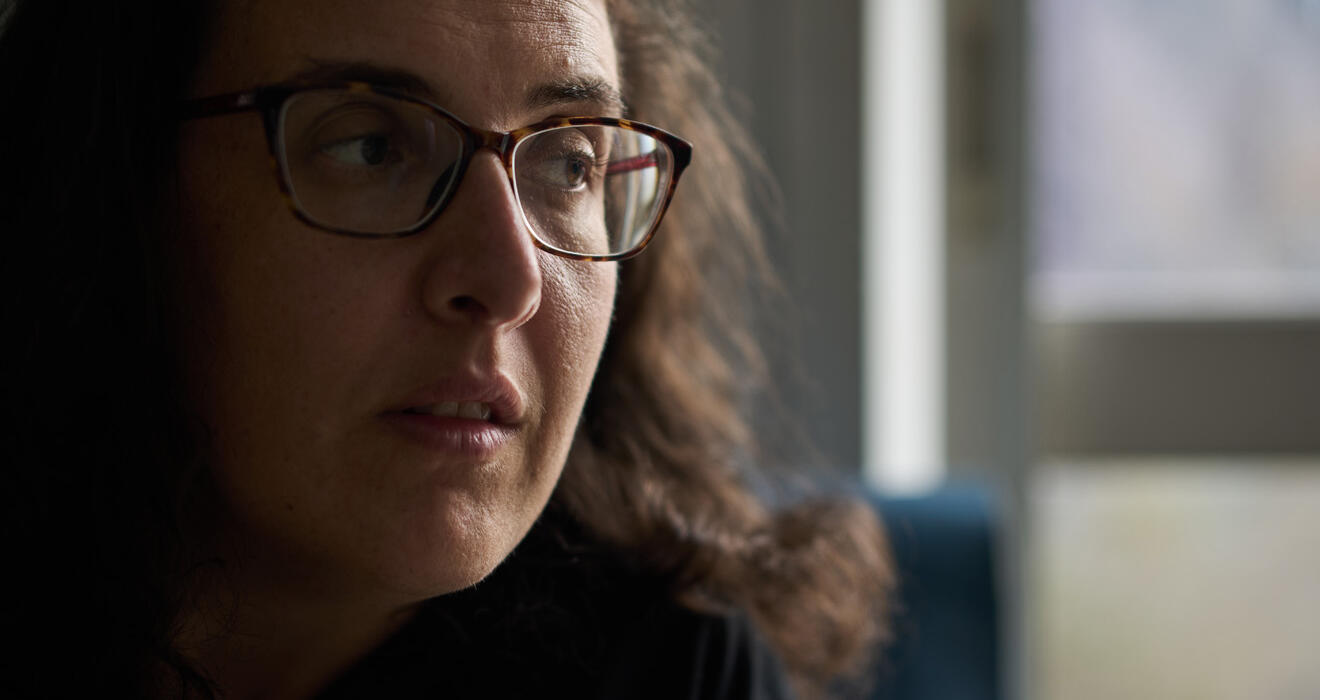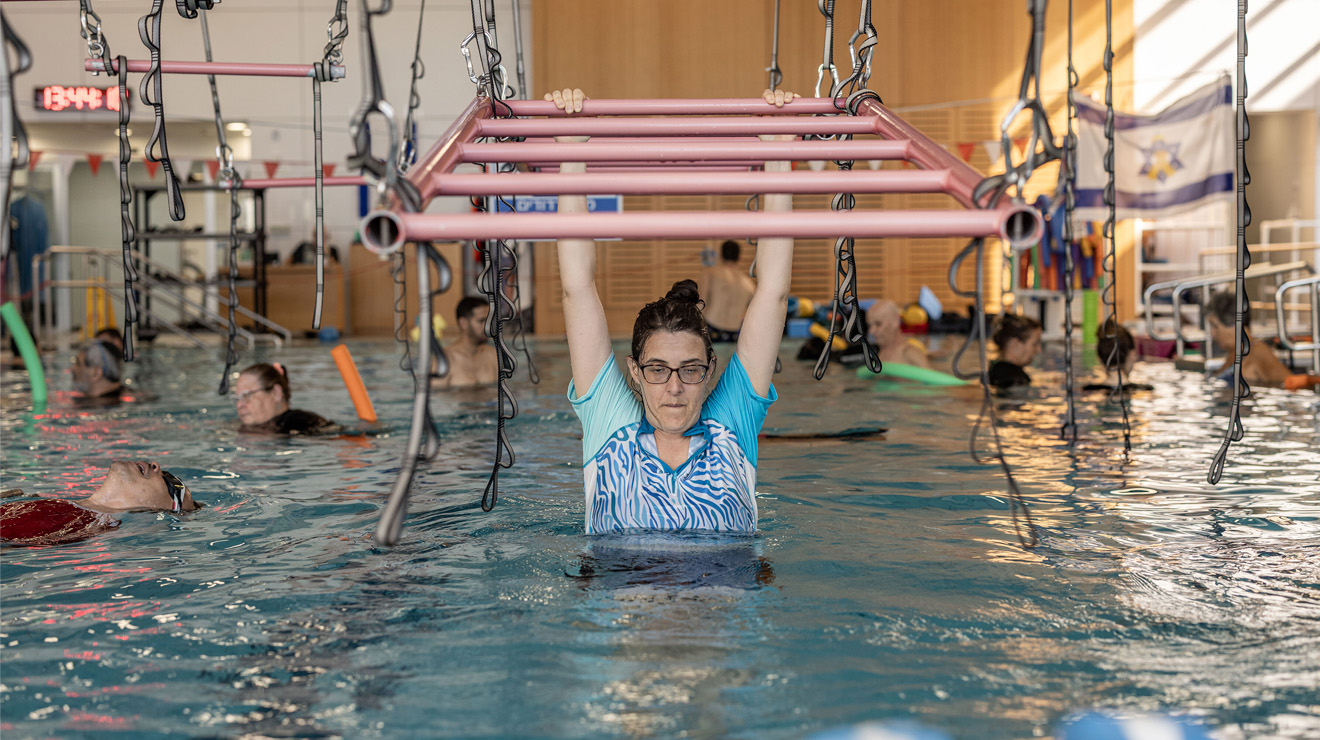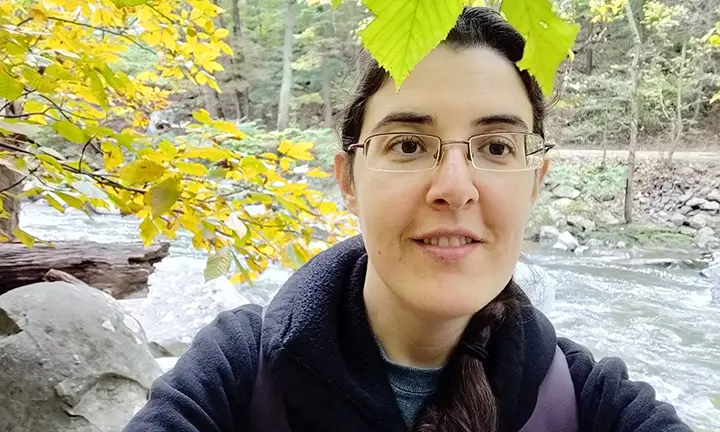
A notebook.
After more than 900 days in captivity, that’s what Princeton Ph.D. student Elizabeth Tsurkov was thinking about on Sept. 9, the day she regained her freedom from Kataib Hezbollah, a Shiite militia group.
“I was not filled with joy,” Tsurkov tells PAW over Zoom from Israel, where she was recovering as of mid-November. “I expected this is going to be the happiest day of my life. No, I was mainly concerned about my notebook.”
Tsurkov spent years filling that notebook with thoughts on her research, “developing these projects … rewriting them to make it cleaner, to make it better.” When she was released, she didn’t have the chance to bring it with her.
Just reliving the memory makes Tsurkov upset again.
“I think I’m a typical Ph.D. candidate of Princeton in the sense that I’m very passionate about the research that I’m conducting,” Tsurkov says.
Tsurkov, who is a dual Russian-Israeli citizen, was kidnapped in March 2023 while in Iraq conducting field research for her Ph.D. in politics. A 2021 draft of her thesis prospectus shows Tsurkov was researching groups in Iraq, Iraqi Kurdistan, and Lebanon — such as the Lebanese Forces, a political party and former militia group — that are popular among locals despite not providing material benefits.
Israel and Iraq do not share diplomatic relations, and it is against Israeli law for citizens to enter enemy states, even on a foreign passport. Tsurkov, who had been to Iraq before, used her Russian passport to enter the country and says she was careful not to share her Israeli identity when meeting with and interviewing locals.
A week before her planned departure from Iraq, and eight days after undergoing emergency back surgery, Tsurkov was leaving a café in an upscale neighborhood of Baghdad when she was blindfolded, sexually assaulted, and kidnapped by at least one man, possibly several, who dragged her into a waiting black SUV. U.S. and Israeli officials have since confirmed the kidnappers were from Kataib Hezbollah, which has ties to Iraq and Iran and is considered a terrorist organization by the United States government.
She was taken to a large house where she was isolated and starved. During this time, Tsurkov’s research was often at the front of her mind.
“Unfortunately, I didn’t have notebooks at the time or a computer to be able to type on. But I did have [a] very enforced digital detox. And that was very useful … just thinking about my Ph.D.,” Tsurkov says, comparing her forced situation without access to writing materials, making her research even more challenging, to other Ph.D. candidates who intentionally disconnect from the world to focus and write.
“During the first month of captivity, I really developed the outline of my Ph.D. really in great detail” in her head, she says.
Around this time conditions got much worse. The kidnappers discovered Tsurkov’s Israeli identity after going through her phone and began physically torturing her. They thought she was an intelligence agent and demanded she confess to crimes she didn’t commit. Since her release, Tsurkov has given interviews to The New York Times, IranWire, and the Associated Press in which she detailed the beatings, whippings, and electrocution she endured. On more than one occasion, she was beaten so severely that she lost hearing. They pestered her about her sex life, touched her inappropriately, and threatened to rape her. All the while, she says, she fabricated information to play along and try to appease her torturers.
At night, while trying to fall asleep, Tsurkov struggled to relax. To stop replaying torture sessions in her mind, “I would constantly tell myself, just think about your Ph.D. Just think about your research. So that’s what I tried to do. I would recite whole chapters that I would write in my head.”
“I would constantly tell myself, just think about your Ph.D. Just think about your research.”
Whenever she could, Tsurkov attempted to keep pens she was given to write confessions. That sometimes worked. And as the drinking water in Iraq can be deadly, she was given potable water delivered in cardboard boxes, which she used to write “the outline of my Ph.D. And they would confiscate the pieces of cardboard, and I would write it on new pieces of cardboard, and I kept memorizing it. I would walk around in the room or lie down on the pile of blankets on which I was sleeping, and I would give myself lectures about my Ph.D. And I would present it … at first in English, then in Hebrew, then in Arabic, then in Russian, to just keep myself busy, because I had nothing else to do.”
Four and a half months into the ordeal, Tsurkov was moved again, this time to the location — likely a Kataib Hezbollah base near the Iranian border — where she would stay until her release. Thankfully, her situation vastly improved. Though she was still isolated in a windowless room, the torture stopped, and she was supplied with writing materials. For the next two years, she not only pondered her dissertation, but also thought about additional research she would be interested in pursuing. She came up with ideas for a book and other articles she wanted to write.
At times, Tsurkov even used the unique situation to her advantage. While being held at the first location, she asked multiple times for a Quran, “because I thought this is not going to be something that they refuse. Because of course I would prefer to read political science journals, but they’re not available.” She was told she’d be given a copy, but she never received it. The next time she asked, Tsurkov recalls one of her captors said, “’I told you we’re never going to give it to you.’ … And I looked at him like … you are lying. But I didn’t say anything because at that point they were already torturing me.”
The incident underscored her lack of agency and made her feel weak. This helped her relate to people she had been studying who are oppressed and don’t speak up due to fear, which “lowers your perception or respect for the people around you,” because others are also too afraid to speak up or act out. That sparked a new potential avenue of research for Tsurkov. She told The Times that she wanted to share the story of her kidnapping to give voice to Iraqis who have been tortured by Kataib Hezbollah.
In addition, before her kidnapping, Tsurkov had avoided contact with certain groups due to the potential danger, but in captivity, she reasoned, “I’m already in their hands, I might as well ask them for oral consent … to provide me with their oral history.” She interviewed one of her captors and a nurse who visited her. “So that was definitely useful,” she says.
Tsurkov grew up in poverty, lived in a trailer park in the occupied West Bank for most of her childhood, and worked hard to get into Princeton. She was and still is focused on completing her Ph.D.
“This experience of captivity didn’t … cause me to feel that my Ph.D. is unimportant. On the contrary,” she says.
On Sept. 9, President Donald Trump surprised the world when he announced on social media that Tsurkov was “now safely in the American Embassy in Iraq.” Tsurkov herself had been surprised the previous day when she was driven, blindfolded, away from her cell. Then she was turned over to an Iraqi official in a garage in Baghdad.
In her first public statement via a post on X, Tsurkov thanked Trump and other administration officials for campaigning on her behalf.
Deborah Amos, a Ferris Professor of Journalism in Residence and a former roommate of Tsurkov, couldn’t believe it when she heard the news. As a journalist who reports on the Middle East, Amos has “met people who’ve been kidnapped and get out, and there’s not very many of them. And so, it’s astonishing to me.”
Amos says she and Tsurkov reconnected within days of her release and spent an hour crying together on Zoom. To Amos’ relief, Tsurkov sounded “like Elizabeth. That was the most important thing. She really seemed like Elizabeth. She was feisty, she was energetic. I mean, I knew what she’d been through, and so I was kind of being careful, but then she was just herself, and that was so remarkable to hear her voice at that strength.”
At the hospital in Israel, Tsurkov had a joyous reunion with her family, including her sister Emma, who traveled to Princeton and Washington, D.C., to advocate on Elizabeth’s behalf during her captivity.
Since regaining her freedom, Tsurkov has continued working on her dissertation, collecting oral histories remotely. She says she’s willing to do what it takes to get her notebook back, but she’s not expecting to ever see it again.
As of mid-November, Tsurkov was staying at a friend’s house in a suburb of Tel Aviv, Israel. She intends to return to the United States at some point, but “it really depends on how fast my physical therapy progresses and when I’m able to sit, because that is the main limiting factor.” At the moment, she’s “basically not living independently.”
Tsurkov has nerve damage that might be permanent. She says the torturers herniated two discs in her back, among other injuries. “I’m just really in pain all the time.”
Amos says Tsurkov is “in the very best place of all to address those concerns, because this is a group of medical professionals who has been dealing with the hostages of Gaza, so they have an enormous amount of data of how the body responds to that kind of trauma.
“When she’s ready, they will, and she will, decide that she’s ready,” Amos says. “And then she will come home. Well, she will come to her other home, which is Princeton.”
Amaney Jamal, dean of the School of Public and International Affairs and chair of Tsurkov’s dissertation committee, told PAW via email, “First and foremost, I’m so happy that Elizabeth is home and recovering. I’m also thrilled that she will complete her Ph.D., and I look forward to continuing our work together on her dissertation.”
Tsurkov declined to answer questions about the University. Seven months after she was abducted, and three months after the kidnapping was made public, Princeton spokesperson Michael Hotchkiss confirmed that Tsurkov was in Iraq for her approved dissertation. However, since at least April 2022, Iraq has been on the University’s list of locations where travel is “not feasible, even with significant precautions taken,” according to the Permitted Travel Policy.
In 2023, Princeton doctoral student Xiyue Wang *15, who was imprisoned in Iran for more than three years, and his wife, Hua Qu *21, settled a civil lawsuit against Princeton in which they alleged negligence by the University, claiming that advisers encouraged Wang to travel to Iran and failed to support him while he was incarcerated there.
As for her peers, Tsurkov said she “want[s] to express my gratitude to the students at Princeton who came out to support me and my family. They wrote letters, made phone calls, participated in rallies, and all of this kept my name in the news and helped to get me home."
For now, Tsurkov is doing her best to return to normalcy. She spent her last two birthdays alone in a dark cell, but when she turned 39 on Nov. 11 of this year, she traveled to northern Israel to celebrate with family.
“It’s a very nice area, great nature,” she says.
A welcome change after years of not seeing the sun.
Julie Bonette is PAW’s writer/assistant editor.








1 Response
Michael Goldstein ’78
1 Month AgoCulpability for Tsurkov’s Travel Plans
As one of a tiny handful of Princetonians who fought for Elizabeth Tsurkov’s freedom for more than two years, I’m glad that PAW interviewed her after her release from 900 days of torture and brutality. It’s also positive that PAW addresses President Trump’s role in saving Tsurkov’s life, particularly after two years of failure by both the Princeton and Biden administrations.
Unaddressed in the story is the moral and legal culpability of the Princeton administration and her faculty advisers, who approved this vulnerable woman’s plan to go to Iraq. That country continues to bear a U.S. State Department Level 4 Warning: Do Not Travel. As the article points out, another Princeton graduate student, Xiyue Wang *15, settled a lawsuit against the University for “negligence” and lack of support after he too was imprisoned in another Islamist tyranny, Iran, for 40 months (held by the Iranian government, not a militant group as Tsurkov was).